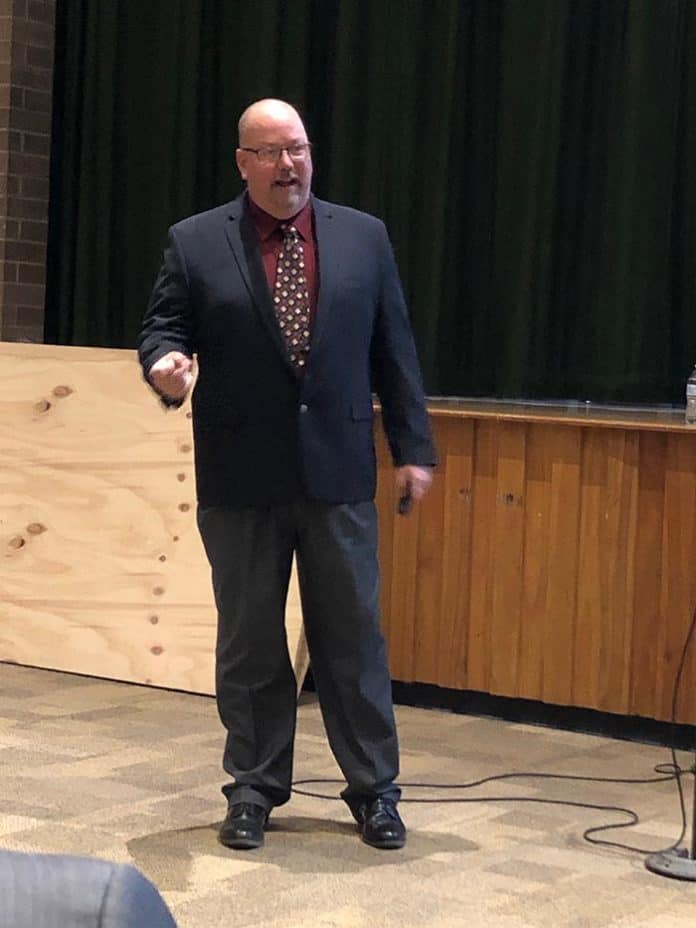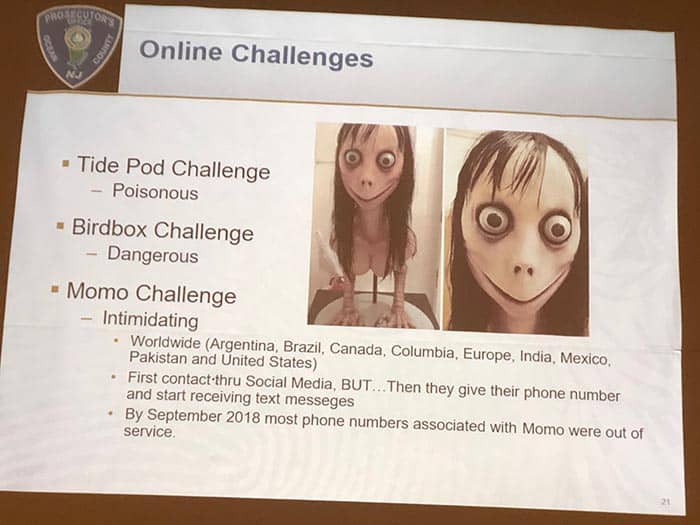
BRICK – It is up to parents to manage their children’s internet access, and no one – not teachers and not the police – can do it for you.
That was the message given by Detective David Brubaker of the High Tech Crimes Unit Ocean County Prosecutor’s Office who presented an Internet Safety Forum at Brick Memorial High School.
“It’s all around us, our lives are immersed in technology, so you have to give kids some education to go along with it,” he said to scores of parents who came to learn about cyber bullying.
The High Tech Crimes Unit gets called out on every crime in Ocean County. The unit has four full-time examiners who conduct some 350 investigations a year.
The examiners perform digital forensics on submitted or seized devices. When there is a search warrant, they start with the router and work their way outward to laptops, desktops, cell phones, fax machines, printers, gaming machines and more.
“Give me someone’s phone and I’ll give you their life,” Brubaker said. “Everything’s traceable on the internet. You can hide behind a fake name and think you’re anonymous, but in four to eight weeks we can trace anything.”
Online threats, including cyberbullying, sexual predators and disturbing content is not just limited to kids, but Brubaker geared the presentation towards threats to school-age children.
“I’ve seen the smallest, quietest, straight-A, Boy Scout-type kids cyberbully,” Brubaker said. “Your kids are pack animals, and they always find the weak link, or the outsider.”
Online gaming can make your children vulnerable to sexual predators since oftentimes kids will give out more information than they should. Sexual predators want to meet your kids and your kids will give out details without even realizing it, he said.
Children should never click on an attachment or links of people they don’t know, he said. If they get a lot of pop-ups, that is a clue that they might have done this, Brubaker said.
“In reality, your kids are going to see porn at a young age. No one wants your child to see disturbing content, but unfortunately it’s a fact of life,” Brubaker said. “It’s up to you to deal with what they see – it’s upsetting but you have to deal with it.”
YouTube is the most popular social network for teens, followed by Instagram and Snapchat.
“Kids can search YouTube for any topic they want – it is the second largest search engine behind Google,” he said.

Snapchat, which is a messaging service that lets users send photos and videos to one another but then disappear after a set time, makes it easy to cyber bully since the content cannot be retrieved.
“Maybe the NSA can retrieve it, but we cannot get Snapchats – once they’re gone, they’re gone,” he said. “We can see that something was sent, but not the content.”
Facebook is still the number one social medium, but that’s because it’s used by all ages and by businesses. Kids don’t use Facebook as much because “it’s not cool anymore,” the detective said.
The use of technology has quickly changed. Very few people sit down at a terminal unless they’re at work. About 80 percent of all social media happens on a cell phone, he said, which makes it easier for your kids to hide it when you walk into a room.
“Bullying will never go away, but if you educate your kids it might not happen as often,” he said.
Brubaker said the long-term effects of social media can follow someone all their life. Colleges have staff who snoop into kid’s backgrounds and proactively search all their social media before an acceptance. Many potential employers do the same, he added.
After his PowerPoint presentation, Detective Brubaker took questions from the audience.
Several parents asked about the “Momo Challenge,” a social media game that encourages children to commit self-injurious acts. The challenge came to light in Brick when a student at Warren H. Wolf Elementary school had allegedly acted on some of the Momo challenges.
“Momo started with a challenge, like ‘draw on your arm,’ and then “stick a pin in your finger until you get a drop of blood,’” Brubaker said.
“It’s creepy and it will scare a kid, but parents have to talk to their kids and tell them no one on the internet will hurt you unless you do it yourself,” he said.
Susan McNamara, who is the district’s Director of Curriculum, said the best options to manage your children’s phones are parental controls, blocking certain sites, tracking their text messages and other provider tools.
“You have to talk to your children, not in a judgey way, but ask why do they want to go in that direction? What are they thinking? Tell them they’re not making the best choice and there are consequences,” she said during the Q and A.
McNamara also suggested shutting the phone down once in a while, even though kids act like “taking away their phone is like taking away their life.”
One parent asked how to find out what the “next big thing” will be on social media. Brubaker said parents have to educate themselves.
“Stay on top of what’s going on, that’s what parenting has turned into,” he said. “You try to stay five steps behind them, not 20 steps behind. “You have to keep up. You are the front line with bullies,” Brubaker said.






